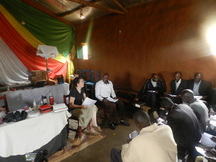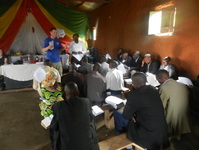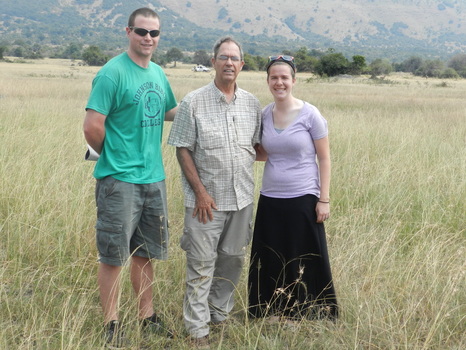
This week we have been teaching at two refugee camps. We taught at the Nyabiheke Refugee Camp on Monday and Tuesday. Now, we are at the Kiziba Refugee Camp, teaching on Thursday, Friday, Saturday, and Monday. Both of these refugee camps are for Congolese refugees who have had to flee the Congo. The houses in the camps are located very close to one another, so there is no land (or very little) to cultivate. The refugees live with little hope or purpose, as most do not have jobs; they live mostly off of international assistance. I cannot imagine living life without a job or without working toward a goal. “Then I realized that it is good and proper for a man to eat and drink, and to find satisfaction in his toilsome labor under the sun during the few days of life God has given him … to accept his lot and be happy in his work—this is a gift of God” (Ecclesiastes 5:18-19). I have become grateful for work, not only for the income it brings, but also because it is a gift from God, bringing satisfaction and enjoyment. With this in mind, it has been a joy to teach these leaders from various churches in the refugee camps and to help them realize their purpose, which extends beyond this world. For while work is good, it is ultimately “meaningless, a chasing after the wind” (Ecclesiastes 2:26); if it is not for God’s glory, then it has no eternal significance. These church leaders are being equipped for a greater purpose; they will be able to help lead their churches, as well as to evangelize the thousands of other refugees in the camp. They may not be able work or cultivate fields, but they can spend their days teaching others what they have learned about the Scriptures, spreading the gospel throughout the camp. This is a purpose that brings hope to the hopeless here in the refugee camps. “For while we are in this [earthly] tent, we groan and are burdened, because we do not wish to be unclothed but to be clothed with our heavenly dwelling…Now it is God who has made us for this very purpose” (2 Corinthians 5:4-5).
Alison

That’s what I’m seeing with Rwanda Challenge. The teachings with the church leaders have been the meat and potatoes: the truths of Scripture that Christ followers must understand. They are foundational to our faith. For example: we are now teaching “Three Lessons on the Holy Spirit.” It’s an essential part of Christianity. It also has great depth and requires much study of God’s Word.
I’ve seen that Frank is giving these church leaders the meat and potatoes. Rwanda Challenge wants to equip these leaders. A leader will not be prepared if they just have the easy and simple things. A church leader will be better equipped when they can “correctly handle(s) the word of truth.” 2 Timothy 2:15
Ben

 RSS Feed
RSS Feed